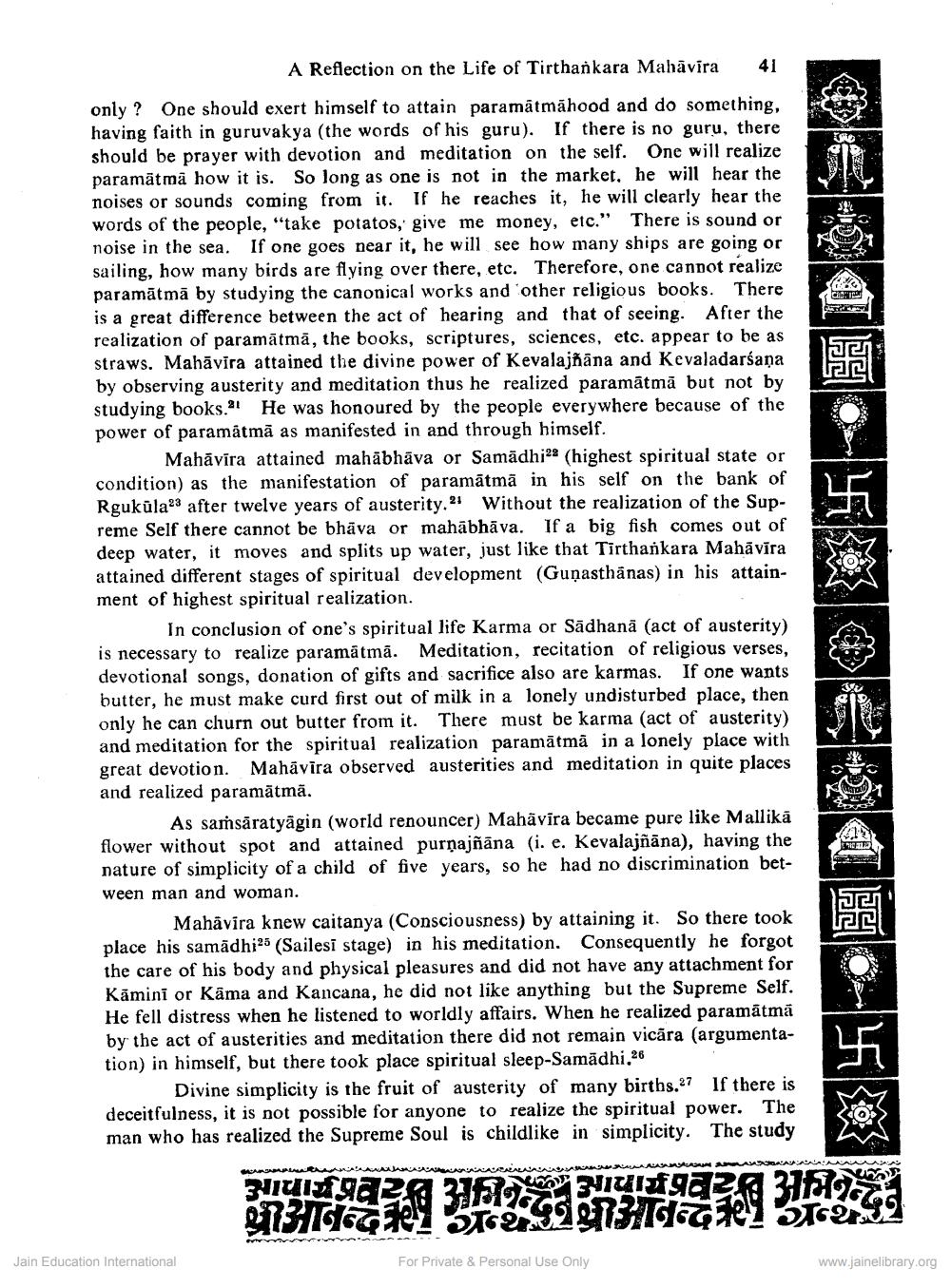Book Title: Reflection on the Life of Mahavira Author(s): J C Sikdar Publisher: Z_Anandrushi_Abhinandan_Granth_012013.pdf View full book textPage 5
________________ CASTRO UL A Reflection on the Life of Tirthankara Mahāvira 41 only? One should exert himself to attain paramātmāhood and do something, having faith in guruvakya (the words of his guru). If there is no guru, there should be prayer with devotion and meditation on the self. One will realize paramātmā how it is. So long as one is not in the market, he will hear the noises or sounds coming from it. If he reaches it, he will clearly hear the words of the people, "take potatos, give me money, etc." There is sound or noise in the sea. If one goes near it, he will see how many ships are going or sailing, how many birds are flying over there, etc. Therefore, one cannot realize paramātmā by studying the canonical works and other religious books. There is a great difference between the act of hearing and that of seeing. After the realization of paramātmā, the books, scriptures, sciences, etc. appear to be as straws. Mahāvira attained the divine power of Kevalajñāna and Kevaladarśaņa by observing austerity and meditation thus he realized paramātmā but not by studying books. He was honoured by the people everywhere because of the power of paramātmā as manifested in and through himself. Mahāvīra attained mahābhāva or Samadhia (highest spiritual state or condition) as the manifestation of paramātmā in his self on the bank of Rgukūla23 after twelve years of austerity.24 Without the realization of the Supreme Self there cannot be bhāva or mahābhāva. If a big fish comes out of deep water, it moves and splits up water, just like that Tirthankara Mahāvīra attained different stages of spiritual development (Guņasthänas) in his attainment of highest spiritual realization. In conclusion of one's spiritual life Karma or Sādhanā (act of austerity) is necessary to realize paramātmā. Meditation, recitation of religious verses, devotional songs, donation of gifts and sacrifice also are karmas. If one wants butter, he must make curd first out of milk in a lonely undisturbed place, then only he can churn out butter from it. There must be karma (act of austerity) and meditation for the spiritual realization paramātmā in a lonely place with great devotion. Mahāvīra observed austerities and meditation in quite places and realized paramātmā. As saṁsāratyāgin (world renouncer) Mahāvīra became pure like Mallikā flower without spot and attained purnajñāna (i. e. Kevalajñāna), having the nature of simplicity of a child of five years, so he had no discrimination between man and woman. Mahavira knew caitanya (Consciousness) by attaining it. So there took place his samadhi25 (Sailesi stage) in his meditation. Consequently he forgot the care of his body and physical pleasures and did not have any attachment for Kamini or Kāma and Kancana, he did not like anything but the Supreme Self. He fell distress when he listened to worldly affairs. When he realized paramātmā by the act of austerities and meditation there did not remain vicāra (argumentation) in himself, but there took place spiritual sleep-Samādhi,26 Divine simplicity is the fruit of austerity of many births.27 If there is deceitfulness, it is not possible for anyone to realize the spiritual power. The man who has realized the Supreme Soul is childlike in simplicity. The study . ماده ده غوغل مقعدها عن عهعععععاهمعرهها AAAAAAAAAAAAA A ALLA MASSAADAN ALASANDRA wa 2 NIUIFAZA W Buiuisa BR 370 श्रीआनन्दमश्रीआनन्दा अन्य Jain Education International For Private & Personal Use Only www.jainelibrary.orgPage Navigation
1 ... 3 4 5 6 7 8 9 10 11 12 13 14 15
